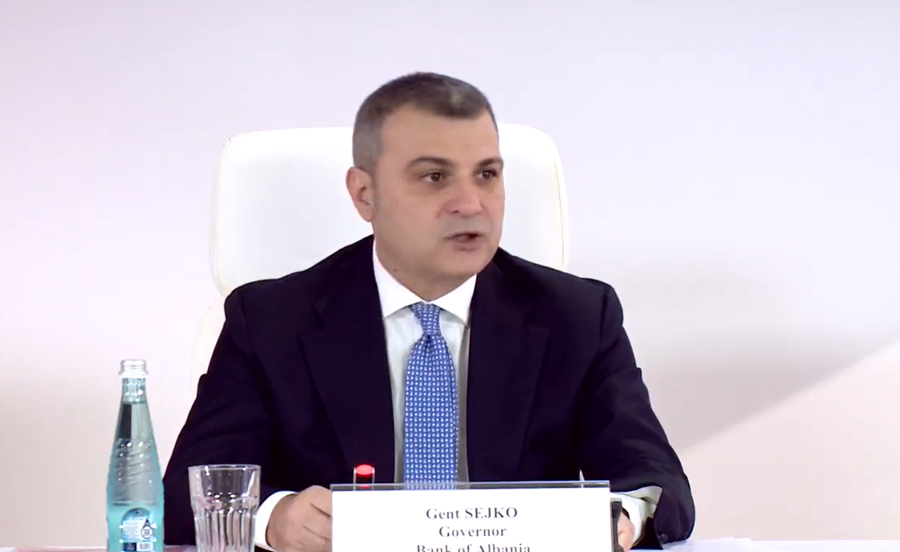
Today, the European Bank for Reconstruction and Development's Transition Report was presented.
Also present at this meeting was the Governor of the Bank of Albania, Gent Sejko, who also delivered a speech to those present, writes A2 CNN.
Sejko spoke during his speech about “Reshaping Industrial Policies in a Changing Global Landscape.”
He added that today we face a completely different global reality, where according to him, geopolitical tensions have caused a 30% increase in the cost of global supply chains since 2020.
The Governor continued by saying that we must invest not only in economic sectors, but also in people, as the basic cell of the workforce.
Governor Sejko's speech:
Dear guests, colleagues and partners,
It is a special pleasure to be among you today to host the presentation of the EBRD Transition Report for 2024.
This report provides an in-depth analysis of a highly dynamic problem of today: the reshaping of industrial policies in a global context transformed by new challenges and opportunities. By making it the central theme of this year’s Report, the EBRD highlights the increasingly complex state and strategic resurgence of industrial policies as a tool for addressing structural changes in developed and emerging economies in the 21st century.
Today, these policies are not simply a tool for supporting existing industries, but should be seen as a lever to create diversified and innovative economies. For more than two decades, in Albania and in the region, we have prioritized structural reforms that build strong institutions, improve the business climate, and create an open and competitive economy. These reforms have contributed to an average economic growth of 3.5-4% per year over the past five years, a reduction in unemployment to 11.3% in 2024, and an increase in private consumption by 7%. These reforms have been and remain essential, but they are no longer sufficient.
Today we face a completely different global reality:
Geopolitical tensions have caused a 30% increase in the cost of global supply chains since 2020;
trade fragmentation has reduced global trade flows by 5.4% in 2023, according to the WTO;
Reindustrialization policies in advanced economies (e.g. the US Inflation Reduction Act and the EU Green Deal) are channeling over 80% of global investments towards clean technologies.
Many economies — including ours — are now facing demographic decline, labor market changes, and sectoral imbalances. In this context, the debate on industrial policies has moved from discussion to clear, data-based strategies.
What does this mean in practice?
First, we need to understand that industrial policies today are not about protecting legacy industries, but about fostering the sectors of the future—those that can grow, scale, and create sustainable value. For many EBRD countries, including Albania, the path to growth through traditional industrial exports has become more difficult. In its place, a new opportunity is emerging: the export of digitized, internationally tradable services.
These “global innovation services” — such as information technology, design, logistics and data analytics — are at the heart of productivity growth and added value, but to develop them, strong foundations are needed: investment in education, a skilled workforce, modern digital infrastructure and high institutional capacity. Several Central and Eastern European economies have already become leading exporters of computer services. Albania also has the potential to follow this path.
Secondly, the policies we undertake must be aligned with the European integration process. As a small and open economy, with 70% of trade oriented towards the EU, Albania has more to gain by moving towards convergence with the European Union. In addition, SEPA membership brings us closer to European markets and reduces the costs of international transactions by 30%.
Third, we need to ensure inclusiveness and sustainability. Industrial policies should not only focus on sectors where we have the potential to win in global markets, but also on those that are vital for employment and social cohesion at home. They should be supported by local policies tailored to specific contexts — such as special economic zones — and carefully designed, highlighting specific local and regional characteristics.
Fourth, state aid should focus on high-potential firms. Evidence shows that young and dynamic firms are key drivers of employment and innovation. Policies aimed at stimulating them, such as credit guarantees, subsidized loans or state-backed venture capital funds, can make a big difference.
Dear guests,
In this debate on industrial policy and development directions, the role of the central bank, although not direct, is special and irreplaceable.
The central bank does not design industrial policies, but contributes to them as a guarantor of macroeconomic and financial stability – a fundamental condition for any sustainable development. Today, we can say that the Albanian economy continues to grow - GDP grew by 4% in 2024, inflation remains at 2%, private lending has increased by 16.7%, and the non-performing loans ratio has fallen to a historic level of 4%. This reflects a healthy, stable financial system capable of supporting the real sector.
Price stability, functional financial systems, a banking sector and a modern payment system that serves the real economy — are important prerequisites for long-term investment and sustainable development of the country. Beyond this, the Bank of Albania is also making an important contribution to improving financial inclusion, through payment system innovation and SEPA membership, institutionalizing the basic account, effective supervision, financial education and promoting financial innovation. These interventions open up new markets and opportunities, so the Bank of Albania will continue to make its contribution in all these directions, with dedication and professionalism.
In conclusion, I invite you to be ambitious, but cautious; to design smart and comprehensive industrial policies, consistent with our long-term aspirations. Above all, we must invest not only in the sectors of the economy, but also in people, as the basic cell of the workforce, as well as in the institutions and infrastructure that will define the Albania of tomorrow, on our journey towards European integration, as a space of opportunities for continuous transformation. (A2 Televizion)











